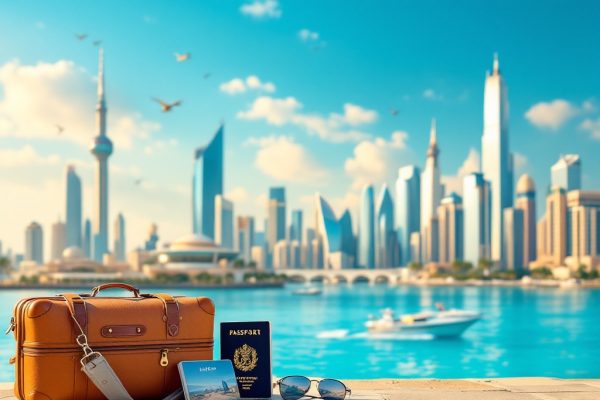Tourism in China: How to Prepare for a Trip
Dreaming of exploring China? From the Great Wall to bustling markets, this comprehensive guide ensures a smooth and enriching journey. Discover crucial visa requirements, navigate transportation like a pro, and master essential health preparations. Learn how to avoid tourist traps, embrace local customs, and unlock authentic cultural experiences. Prepare for your unforgettable China adventure – start planning today!
Important information

- Obtain a visa (likely an L visa for tourists) 2-3 months before your trip by contacting the Chinese embassy or consulate.
- Book flights and accommodations early for better prices and availability.
- Consult your doctor about recommended vaccinations like Hepatitis A & B, typhoid, and tetanus and check travel advisories for health risks.
- Learn basic Mandarin phrases, familiarize yourself with Chinese customs and be aware of local regulations.
- Research transportation options (high-speed rail, public transport, taxis) and plan your itinerary in advance.
Preparing for Your Trip to China
Planning a trip to China? Secure your visa through the Chinese embassy 2-3 months in advance. Booking flights and accommodations early often yields better deals. Pack according to the weather and your itinerary, prioritizing comfortable walking shoes and appropriate clothing. Essentials include a travel adapter, necessary medications, a reusable water bottle, and a lightweight backpack. A guidebook can be invaluable. Most importantly, remember your passport, visa, and travel insurance details. Learning basic Mandarin phrases and familiarizing yourself with Chinese customs can greatly enhance your experience. Research transportation options beforehand. Exploring local cuisine is a must-do. Consult your doctor about recommended vaccinations, including Hepatitis A and B, typhoid, and tetanus. Check travel advisories for current health risks and pack a first-aid kit with personal medications. Locate local health facilities and emergency numbers in case of unexpected situations.
Visa Application: Secure your Chinese visa through the embassy 2-3 months before your trip.
Travel Bookings: Book flights and accommodations early for potential cost savings.
Packing Essentials: Pack comfortable walking shoes, weather-appropriate clothing, a travel adapter, necessary medications, a reusable water bottle, and a lightweight backpack.
Essential Documents: Don’t forget your passport, visa, and travel insurance information.
Cultural Immersion: Learn basic Mandarin and familiarize yourself with Chinese customs.
Transportation: Research and plan your transportation in advance.
Health Preparations: Consult your doctor about recommended vaccinations (Hepatitis A & B, typhoid, tetanus). Check travel advisories and pack a first-aid kit with any personal medications. Locate local health facilities and emergency numbers.
Visa Requirements and Application Process
Planning a trip to China? Most travelers need a visa. For tourists, the L visa is the standard option, permitting stays of up to 30 days. To apply, gather your valid passport, passport-sized photos, and a completed application form. You’ll also need proof of your travel arrangements and where you plan to stay. Remember, visa requirements may differ based on your nationality, so check the specific details with your nearest Chinese embassy or consulate before you go.
Planning Your Itinerary
Planning your trip to China should ideally begin two to three months in advance. This lead time allows you to secure your visa, book flights and accommodations, and research destinations. Booking early often results in lower prices for airfare and hotels. It also gives you time to create a detailed itinerary, including must-see attractions like the Great Wall, ancient temples, and bustling markets. Advance planning ensures a smoother, more enjoyable trip.
Start planning your China adventure two to three months in advance. This timeframe allows ample opportunity to secure your visa and book flights and accommodations.
Research potential destinations and consider must-see attractions and activities. Explore options like the Great Wall, ancient temples, or bustling markets.
Early bookings often translate to significant savings on airfare and hotels. Securing your bookings in advance can help you manage your travel budget effectively.
Craft a detailed itinerary, incorporating your chosen destinations and activities. A well-planned itinerary ensures a more organized and fulfilling trip.
Managing Logistical Considerations
Planning a trip to China? Logistics are essential. While spring and autumn are popular, drawing larger crowds, consider visiting during less busy times. A carefully planned itinerary is crucial for a smooth trip.
Currency Exchange and Payment Methods
In China, the official currency is the Renminbi (RMB), also known as the yuan (CNY). For the best exchange rates, use authorized banks, hotels, or exchange bureaus. Steer clear of airport exchanges, as their rates are typically less favorable.
Mobile payments, particularly Alipay and WeChat Pay, are extremely popular and convenient for various transactions. Setting these up before your trip is recommended. However, cash remains essential for smaller vendors, street markets, taxis, and buses.
While major cities readily accept credit cards like Visa, Mastercard, and American Express, their use becomes less frequent in smaller towns and rural areas. Therefore, carrying cash is advisable.
Entry and Exit Procedures
Planning a trip to China? Here’s what you can expect upon arrival:
Immigration. Proceed through immigration, having your passport and any necessary visas readily available.
Customs. Be prepared to go through customs. Familiarize yourself with China’s customs regulations regarding restricted items.
Arrival/Departure Card. Most visitors will need to complete an arrival/departure card.
Quarantine. Depending on your health status and recent travel history, you may be subject to a quarantine check.
Traveling During Peak Seasons and Public Holidays
Traveling to China offers a unique experience, especially if you plan your trip strategically. Avoid peak seasons like Chinese New Year and National Day to escape large crowds and enjoy a more relaxed atmosphere. Booking accommodations and transportation in advance is crucial for a smooth trip, regardless of your chosen dates. Consider exploring less-traveled destinations or alternative travel dates for a more authentic and less crowded experience. Pre-booking tours and tickets not only saves you time but also opens doors to unique experiences and hidden gems, allowing you to discover a different side of China.
Travel Tips for China
Pack your bags with clothing suitable for various weather conditions. Comfortable walking shoes are essential for exploring. Bring a universal power adapter to keep your devices charged. Don’t forget your medications and a basic first-aid kit for minor ailments. A reusable water bottle is crucial for staying hydrated throughout your trip. For easier communication, consider a phrasebook or a translation app. Take some time to learn about Chinese dining etiquette, including the proper use of chopsticks. Demonstrating respect for local customs and traditions will enrich your experience. Don’t miss the chance to savor regional specialties for an authentic taste of the local culture. Be sure to be aware of and adhere to local regulations.
Packing Essentials for Diverse Weather
Pack clothing suitable for both warm and cool weather, as conditions can change. Comfortable walking shoes are essential for exploring your destination. Bring a power adapter to keep your electronics charged and any necessary medications. A reusable water bottle is recommended to stay hydrated throughout your trip. Remember essential documents: passport, visa, and travel insurance information. A small first-aid kit can be invaluable for treating minor injuries.
- Clothing for warm and cool weather,
- Comfortable walking shoes,
- Power adapter,
- Necessary medications,
- Reusable water bottle,
- Passport, visa, and travel insurance information,
- Small first-aid kit.
Understanding Cultural Differences and Local Customs
Learn basic Mandarin phrases. Demonstrating even a basic understanding of the local language shows respect and can be incredibly helpful in navigating your travels.
Use customary greetings. A simple nod or slight bow is a respectful way to greet people in China.
Show respect when exchanging gifts. Use both hands when giving or receiving a gift to signify respect.
Be mindful of public displays of affection. These are less common in Chinese culture than in Western cultures.
Practice proper dining etiquette. Try to use chopsticks correctly, and be mindful of other dining customs.
Understand tipping customs. Tipping is generally not expected in China, unlike in many Western countries.
Tipping Practices and Dining Etiquette
Dining etiquette in China differs significantly from Western customs. Tipping is not customary in restaurants, hotels, or for most services. However, tour guides and drivers working with tourists may expect gratuities. Chopsticks are the standard utensils, and attempting to use them shows respect for local customs. Meals are served family-style. Offer dishes to others at the table before serving yourself. Slurping noodles is perfectly acceptable, and it’s even considered polite to leave a small amount of food on your plate at the end of the meal.
Using Translation Apps and Basic Mandarin Phrases
Traveling in China is made easier with translation apps, but knowing basic Mandarin phrases can enhance your trip. Download apps like Pleco, Waygo, or Google Translate. Practice common greetings like “ni hao” (hello), “xiexie” (thank you), and “zai jian” (goodbye). These phrases can enrich your cultural interactions and overall travel experience.
Transportation Options in China
China offers diverse transportation options for travelers. For efficient intercity travel, the high-speed rail network provides swift connections. Private transport allows personalized exploration at your own pace, but navigation can be challenging. Within cities, public transport, including subways and buses, offers readily accessible options. Beijing’s extensive subway system exemplifies this urban convenience. Domestic flights connect cities nationwide, proving especially useful for reaching remote areas. For shorter intra-city trips, taxis and ride-sharing apps ensure quick and convenient travel.
Intercity Travel
- High-speed rail: efficient and swift connections between cities,
- Private transport: personalized exploration at your own pace (navigation can be challenging),
- Domestic flights: connect cities nationwide, essential for reaching remote areas.
Intra-city Travel
- Public transport (subways and buses): readily accessible within cities,
- Taxis and ride-sharing apps: quick and convenient for shorter trips.
High-Speed Trains for Intercity Travel
China’s high-speed trains provide a popular and efficient way to travel between cities. Passengers enjoy comfortable and convenient journeys, quickly covering long distances. The extensive high-speed rail network connects major cities across the country.
Using Public Transport in Urban Areas
China offers diverse public transport options across its cities. Subways are prevalent, particularly in hubs like Beijing and Shanghai, boasting extensive networks. Buses provide wider coverage, although traffic may cause delays. Trams offer another practical choice in select cities. For up-to-date information and navigation, use transport apps offering real-time updates and helpful route guidance.
Private Transport for Hassle-Free Exploration
Traveling in China by private transport offers the freedom to tailor your itinerary. Hiring a car and driver is a popular choice, especially for exploring remote areas or enjoying a more comfortable trip. Within cities, ride-hailing apps like Didi Chuxing (China’s equivalent to Uber or Lyft) offer convenient transportation.
Hiring a Car and Driver
This option is particularly beneficial for:
- Venturing into remote regions,
- Families or groups,
- Travelers with mobility limitations.
Renting a Car Yourself
You’ll need:
- A valid Chinese driver’s license or,
- A recognized International Driving Permit.
Be aware that navigating China’s roads and the language barrier can be challenging.
Health and Safety Considerations
Safeguarding your trip with travel insurance is crucial. It covers unforeseen medical expenses, trip cancellations, and lost luggage. Before embarking on your journey, consult your doctor about necessary vaccinations and medications. For international travel guidance, the CDC and WHO are invaluable resources. A well-stocked first-aid kit is also essential, along with careful attention to food and water safety.
The CDC and WHO offer comprehensive travel advisories, providing vital health information, particularly for regions like China. Checking for health alerts and outbreaks before you leave is a must.
For personalized recommendations, consider consulting a travel health specialist. Familiarize yourself with local emergency numbers and procedures – invaluable knowledge in a crisis.
Travel Insurance and Personal Health
Safeguard your trip with travel insurance, protecting you from unforeseen issues like medical emergencies, cancellations, and lost luggage.
Before your China adventure, consult your doctor about necessary vaccinations and medications.
Prepare a well-stocked first-aid kit with pain relievers, antidiarrheal medicine, and antiseptic wipes.
If traveling with a pre-existing condition, ensure you have ample medication and research local medical facilities beforehand. Carrying a copy of your medical history can also be beneficial.
Prioritize food and water safety to maintain your well-being throughout your travels.
Travel Health Services and International Guidelines
Planning a trip to China? Consult your doctor about recommended vaccinations and necessary health precautions. For detailed information on health risks and suggested vaccinations, explore the excellent travel guides provided by the CDC and WHO. Consider travel insurance that covers medical evacuation and repatriation. Pack a first-aid kit containing essential medications, insect repellent, and sunscreen. To avoid stomach issues, prioritize food and water safety by opting for bottled water and exercising caution with street food. Researching local customs and regulations will enrich your travel experience.
Consult your doctor. Discuss recommended vaccinations and necessary health precautions for your trip to China.
Research health risks and vaccinations. Explore the travel guides provided by the CDC and WHO for detailed information.
Consider travel insurance. Ensure your insurance covers medical evacuation and repatriation in case of emergencies.
Pack a first-aid kit. Include essential medications, insect repellent, and sunscreen.
Prioritize food and water safety. Opt for bottled water and exercise caution with street food to avoid stomach issues.
Research local customs and regulations. Learning about local customs will enhance your travel experience.
Avoiding Common Pitfalls and Tourist Traps
Choosing a licensed tour guide can elevate your trip from memorable to unforgettable. Licensed guides offer in-depth expertise, enriching your experience with insightful knowledge. Unlicensed guides may offer lower prices, but they often lack the knowledge and training to provide accurate information or quality service. Book through reputable tour operators in advance and conduct thorough research to secure a knowledgeable and reliable guide.
Protecting Yourself from Tourist Scams
Tourist scams are a real threat. Stay alert and avoid pushy vendors or incredibly cheap deals. Research common scams at your destination beforehand to be prepared. Before buying anything, verify its authenticity.
Supporting Local Businesses
For souvenirs, choose established businesses and official vendors. This not only protects you from scams but also supports legitimate local commerce.
Choosing Reliable Tour Guides
When choosing a tour guide, verify their credentials and licenses. Check online reviews on sites like TripAdvisor and Viator. Opt for a certified guide, ideally endorsed by a reputable organization such as the China National Tourism Administration. Seek recommendations from travel agencies or experienced globetrotters. A knowledgeable guide significantly enriches your trip by providing historical context, cultural insights, and invaluable language assistance. Here’s a step-by-step guide to finding the perfect tour guide:
Verify Credentials and Licenses. Ensure your chosen guide possesses the necessary certifications and licenses to operate legally and professionally.
Check Online Reviews. Explore platforms like TripAdvisor and Viator for genuine feedback from previous travelers to gauge the guide’s expertise and service quality.
Seek Recommendations. Reach out to trusted travel agencies or experienced globetrotters for personalized recommendations based on their firsthand experiences.
Prioritize Certified Guides. Choose a certified guide, preferably one endorsed by a respected organization like the China National Tourism Administration, for assured quality and professionalism.
A knowledgeable guide significantly enriches your trip by providing historical context, cultural insights, and invaluable language assistance.
Identifying and Avoiding Tourist Traps
Planning a trip requires savvy research. Explore potential destinations and attractions while keeping an eye out for tourist traps. Comparing prices and reading reviews can help you avoid scams and overpriced souvenirs. Be wary of pushy vendors; don’t feel pressured to buy. Learning to identify common scams, such as fake goods, is crucial. Negotiating prices, particularly in markets, can save you money. Patronize reputable establishments and utilize official transportation. For a more authentic experience, consider less-crowded attractions. Here’s a step-by-step guide to smarter travel planning:
Research your destination thoroughly. Explore potential destinations, attractions, and local customs. Identify potential tourist traps and scams.
Compare prices and read reviews. Check prices for accommodations, flights, and attractions from different providers. Read reviews to avoid scams and overpriced souvenirs.
Be cautious of pushy vendors. Don’t feel pressured to buy from street vendors or tour operators. Take your time to make informed decisions.
Learn to identify common scams. Be aware of common travel scams, such as fake goods, rigged currency exchange, and taxi scams. Educate yourself on how to avoid them.
Negotiate prices. Negotiating prices, especially in markets, can save you money. Be confident and respectful when bargaining.
Patronize reputable establishments. Choose reputable hotels, restaurants, and tour operators. Look for certifications or endorsements from trusted organizations.
Utilize official transportation. Use official taxis, buses, or trains whenever possible. Avoid unlicensed transportation providers, which can be unsafe or unreliable.
Consider less-crowded attractions. Explore lesser-known attractions or visit popular sites during off-peak hours for a more authentic and enjoyable experience.







